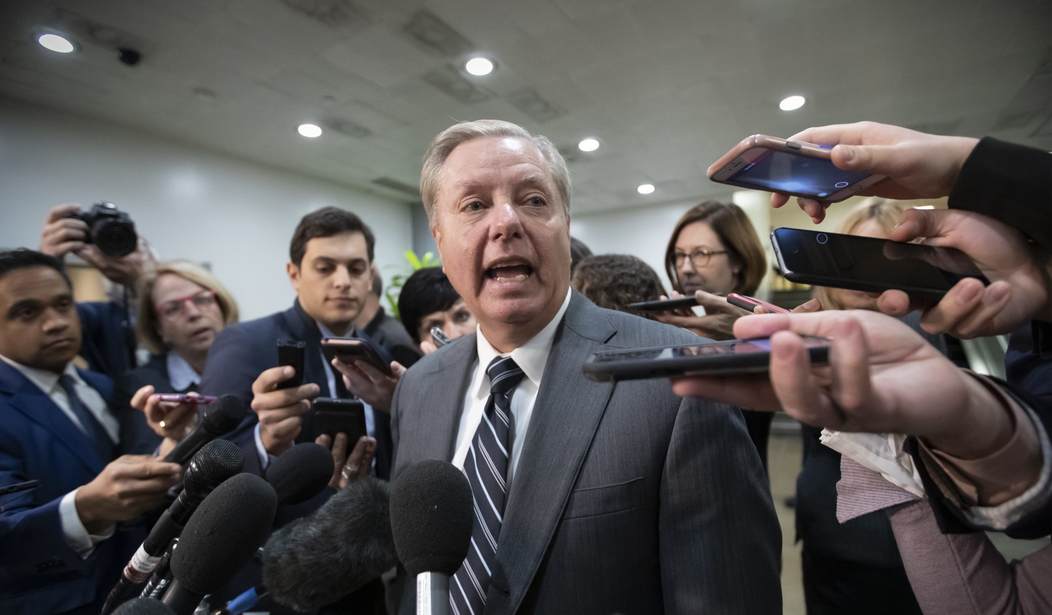WASHINGTON — The select few senators who were briefed today by CIA Director Gina Haspel on the murder of Washington Post columnist Jamal Khashoggi emerged convinced of the culpability of Crown Prince Mohammed bin Salman, and some wanted the facts revealed to all senators.
Haspel was not included, despite requests from senators, in an administration briefing last week on Capitol Hill led by Secretary of State Mike Pompeo and Defense Secretary James Mattis.
Khashoggi, a critic of the Saudi ruling family who had lived in exile for a year in Northern Virginia, was killed and dismembered last month at the Saudi consulate in Istanbul when he went to get papers needed to marry his Turkish fiancee.
Sen. Lindsey Graham (R-S.C.) was so “pissed” at the exclusion of Haspel that he voted last week to stop support for the Saudi war in Yemen. Today’s briefing with Haspel was arranged with Republican and Democratic leaders of pertinent national security committees along with Majority Leader Mitch McConnell (R-Ky.) and Minority Leader Chuck Schumer (D-N.Y.).
While on Capitol Hill, Haspel paid her respects at the casket of President George H.W. Bush alongside former CIA directors John Brennan and George Tenet.
“While I will not discuss the content of the Haspel briefing, it reinforced the need for a strong response to the murder of Jamal Khashoggi,” Schumer said in a brief statement afterward. “CIA Director Haspel should brief the full Senate without delay.”
Graham told reporters that the briefing confirmed the “smoking saw” — a reference to the bonesaw used to dismember the journalist.
Graham said he left the briefing convinced it was “virtually impossible for an operation like this to be carried out without the crown prince’s knowledge.”
“I left the briefing with high confidence that my initial assessment of the situation is correct. I left the briefing being amazed by our CIA and intelligence community’s capability and their analytical reasoning. The CIA, in my view, rose to the occasion in terms of informing the Congress about what happened on Oct. 2, what’s happened since and what happened before. So I am very satisfied with the briefing,” he said. “There is a desire by the intelligence community to limit the number of people briefed. After that request was made, I understand now why they want to keep it more limited than before.”
“So here’s my takeaway: that Saudi Arabia’s a strategic ally and the relationship is worth saving, but not at all costs. We’ll do more damage to our standing in the world and our national security by ignoring MBS than dealing with him,” Graham continued. “MBS, the crown prince, is a wrecking ball. I think he’s complicit in the murder of Mr. Khashoggi to the highest level possible. I think the behavior before the Khashoggi murder was beyond disturbing. And I cannot see him being a reliable partner to the United States. Saudi Arabia and MBS are two different entities. If the Saudi government is going to be in the hands of this man for a long time to come, I find it very difficult to be able to do business because I think he’s crazy, I think he is dangerous, and he has put the relationship at risk.”
On the previous briefing, Graham said he thought Pompeo and Mattis are “following the lead of the president” in asserting there wasn’t a “smoking gun” pointing to the prince.
“There’s not a smoking gun, there’s a smoking saw,” Graham said. “You have to be willfully blind not to come to the conclusion that this was orchestrated and organized by people under the command of MBS and that he was intricately involved in the demise of Mr. Khashoggi.”
Senate Foreign Relations Committee Chairman Bob Corker (R-Tenn.) told reporters that there is “zero question” in his mind that the crown prince “ordered the killing, monitored the killing, knew exactly what was happening, planned it in advance.”
“If he was in front of a jury, he would be convicted in 30 minutes — guilty,” he added. “So the question is what do we do about that. So far — it’s unfortunate — but I think they feel like this is something that’s come and passed because the administration has not spoken to this in a way — they’ve spoken to it in a manner that really gives them immunity. And so what the message is to him and those around him is that you can go around killing journalists, countries like the United States can know beyond a shadow of a doubt… the message that we’ve sent to him is one that will cause him to continue on the path that he’s on, and I’m sure other actors in the region will take note of that.”
Corker said he’s trying to encourage the administration to be stronger on the issue. “This has got to be strongly condemned,” he said.
Foreign Relations Committee Ranking Member Bob Menendez (D-N.J.) said that before this briefing he “was convinced that we had to take steps on the war in Yemen and I believe that we had to take steps on the Saudis.”
“I am only solidified in that view after this briefing,” Menendez added. “It is my hope that the Senate will act and send a strong, unequivocal message that such actions cannot stand and I believe that my legislation with Senator Graham is the appropriate response.”
That bill, introduced last month along with Sens. Todd Young (R-Ind.), Jack Reed (D-R.I.), Jeanne Shaheen (D-N.H.), and Susan Collins (R-Maine), would suspend weapons sales to Saudi Arabia, prohibit U.S. refueling for Saudi aircraft engaged in the Yemen war, sanction anyone who blocks humanitarian aid to Yemen, sanction all those involved in the murder of Khashoggi, require a comprehensive report on human rights in Saudi Arabia, and more.









Join the conversation as a VIP Member